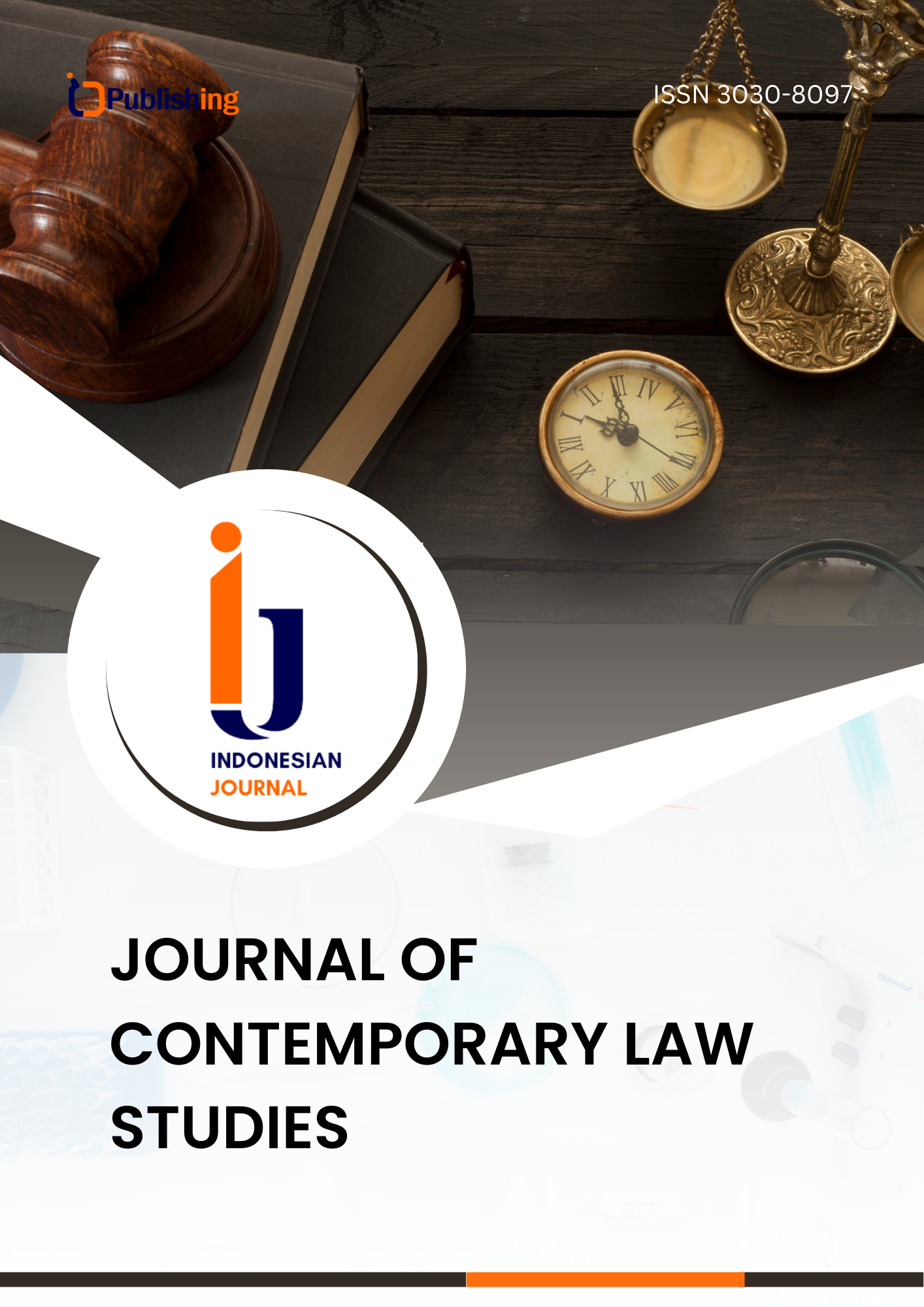Penerapan Prinsip Fiduciary Duty Untuk Mewujudkan Good Corporate Governance Dalam Perseroan Terbatas
DOI:
https://doi.org/10.47134/lawstudies.v2i2.3583Keywords:
Limited Liability Company, Fiduciary Duty, GCGAbstract
This study examines the application of the fiduciary duty principle in realizing Good Corporate Governance (GCG) within Limited Liability Companies in Indonesia. Fiduciary duty serves as a fundamental principle requiring directors and commissioners to act in good faith, with loyalty and prudence, to safeguard the interests of the company and its stakeholders. This research employs a normative juridical approach by analyzing relevant legal frameworks, literature, and regulations, particularly Law Number 40 of 2007 concerning Limited Liability Companies. The findings indicate that effective implementation of fiduciary duty strengthens corporate accountability, transparency, and compliance with legal provisions, ultimately fostering a more ethical and sustainable business environment. However, challenges such as conflicts of interest, lack of transparency, and limited awareness among corporate executives hinder its full implementation. Therefore, continuous education and training for directors and management are essential to enhance their understanding of fiduciary responsibilities. Despite the study’s limitation in scope, which is primarily focused on the Indonesian legal framework, its findings provide valuable insights for improving corporate governance practices. Future research should explore fiduciary duty across various industries to develop more comprehensive recommendations. By consistently applying fiduciary duty principles, companies can achieve robust and accountable corporate governance, thereby supporting long-term corporate growth and sustainability.
References
Adeliana, M. A., & Suryanawa, I. K. (2019). Pengaruh Leverage, Bonus Plan, Ukuran Perusahaan, dan Profitabilitas pada Praktik Perataan Laba. E-Jurnal Akuntansi Universitas Udayana, 26(1), 58–84. https://doi.org/10.24843/EJA.2019.v26.i01.p03
Agustiani, A. P., Nur, H., & Mulyana, A. (2025). Perlindungan Hukum Terhadap Pencipta atas Pembajakan Buku Elektronik ( E-Book ) Yang di Sebarluaskan Secara Bebas Melalui Website. 125–140. https://doi.org/10.47134/lawstudies.v2i2.3333 Perlindungan
Ahmad, A., Muhammad, M., & Narullia, D. (2021). Corporate Risk Disclosure: the Effect of Corporate Governance. Journal of Applied Managerial Accounting, 5(1), 101–113. https://doi.org/10.30871/jama.v5i1.2794
Bakibinga, D. J. (1990). Directors’ Duty to Act Bona Fide in the Interest of the Company. 39(2), 451–460.
Black, B. S. (2005). The Core Fiduciary Duties of Outside Directors. SSRN Electronic Journal, 16(219). https://doi.org/10.2139/ssrn.270749
Dewi, S. (2018a). Mengenal Doktrin Dan Prinsip Piercing the Corporate Veil Dalam Hukum Perusahaan. Soumatera Law Review, 1(2), 380–399. https://doi.org/10.22216/soumlaw.v1i2.3744
Dewi, S. (2018b). Perkembangan Penerapan Prinsip Piercing the Corporate Veil Dalam Pelanggaran Fiduciary Duty Yang Dilakukan Direksi Perseroan Terbatas. Aktualita (Jurnal Hukum), 1(2). https://doi.org/10.29313/aktualita.v1i2.3959
Hariyawan, A. S., & Purwani, S. P. M. E. (2025). Analisis Yuridis Pasal 112 dan Pasal 127 Undang-Undang Nomor 35 Tahun 2009 tentang Narkotika : Upaya Reformulasi untuk Menjamin Kepastian Hukum. 141–152. https://doi.org/10.47134/lawstudies.v2i2.2275 Analisis
Kartika, A., & Nuswandari, C. (2022). Peran Good Corporate Governance Sebagai Mediasi Pengaruh Kinerja Keuangan Terhadap Kebijakan Dividen. Jurnal Studi Manajemen Organisasi, 17(1), 10–22. https://doi.org/10.14710/jsmo.v17i1.38934
Manuaba, I. A. D. P., & Muliartha RM, K. (2019). Pengaruh Audit Operasional dan Pengendalian Internal Terhadap Kinerja Karyawan. E-Jurnal Akuntansi, 28, 322. https://doi.org/10.24843/eja.2019.v28.i01.p13
OJK. (2014). Roadmap Tata Kelola Perusahaan Indonesia. Ojk, 84.
Rahayu, N. L. D., & Wirakusuma, M. G. (2019). Pengaruh Kinerja Lingkungan, Good Corporate Governance, dan Kepemilikan Asing Terhadap Nilai Perusahaan Manufaktur. E-Jurnal Akuntansi, 29(2), 485. https://doi.org/10.24843/eja.2019.v29.i02.p01
Ramadhani, R., & Maresti, D. (2021). Pengaruh Leverage dan Ukuran Dewan Direksi Terhadap Pengungkapan CSR. Ekonomis: Journal of Economics and Business, 5(1), 78. https://doi.org/10.33087/ekonomis.v5i1.262
Styhre, A. (2018). What we talk about when we talk about fiduciary duties: the changing role of a legal theory concept in corporate governance studies. Management and Organizational History, 13(2), 113–139. https://doi.org/10.1080/17449359.2018.1476160
Suparji. (2021). Implementasi Prinsip Good Governance Dalam Sistem Pengelolaan Keuangan Daerah Di Indonesia. Jurnal Magister Ilmu Hukum, 4(1), 1. https://doi.org/10.36722/jmih.v4i1.756
Wardani, D. M., & Sari, S. P. (2025). Analisis Peran Good Corporate Governance dalam Meningkatkan Transparansi Corporate Social Responsibility. 6(1). https://doi.org/10.30595/ratio.v6i1.24696
Wicaksana Putra, N. R., Aminah, A., & Prasetyo, M. H. (2021). Perubahan Status Commanditaire Vennootschap (CV) Menjadi Perseroan Terbatas (PT). Notarius, 14(2), 851–866. https://doi.org/10.14710/nts.v14i2.43754
Wiranti, W. (2023). Tanggung Jawab Pengurus Perseroan atas Tunggakan Pajak Perseroan Berdasarkan Prinsip Fiduciary Duty. Amnesti: Jurnal Hukum, 4(2), 156–169. https://doi.org/10.37729/amnesti.v4i2.3043
Wirawan, D. G., Baharuddin, M., & Tjenreng, Z. (2025). Penerapan Good Governance dalam Reformasi Birokrasi untuk Peningkatan Layanan Publik di Indonesia. 5(1), 179–193.
Yonita, V., & Aprilyanti, R. (2022). Analisis Penerapan Prinsip–prinsip Good Corporate Governance Pada Usaha Kecil dan Menengah (Studi Pada UKM Restoran/Rumah Makan/Kafe di Daerah Cikupa Tangerang). ECo-Fin, 4(1), 1–9. https://doi.org/10.32877/ef.v4i1.454
Yuliana, R., Purnomosidhi, B., & Sukoharsono, E. G. (2008). Pengaruh Karakteristik Perusahaan Terhadap Pengungkapan Corporate Social Responsibility (Csr) Dan Dampaknya Terhadap Reaksi Investor. Jurnal Akuntansi Dan Keuangan Indonesia, 5(2), 245–276. https://doi.org/10.21002/jaki.2008.12
Downloads
Published
How to Cite
Issue
Section
License
Copyright (c) 2024 Abiyyu Paras Syakir Arifin, Sodikin Sodikin

This work is licensed under a Creative Commons Attribution 4.0 International License.




